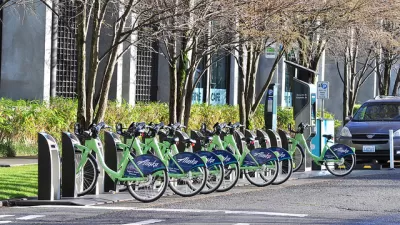In a recent piece, Kristine Johnston reviews Washington D.C.'s Capital Bikeshare program and its accessibility for low-income, non-white populations.
As featured earlier this week in the Georgetown Public Policy Review, Kristine Johnston responds to a Washington Post article highlighting the outreach Capital Bikeshare and some of its persistent barriers to reaching all of the District's population. According to Johnston, these challenges, "include language barriers, lack of money or credit among low-income residents, and limited interest in some neighborhoods." However, Johnston believes there are larger, more systemic issues as stake preventing some of the District's populations from joining Capital Bikeshare.
Mapping out bikeshare docking stations and neighborhood average yearly income, Johnston notes high densities of stations in wealthy downtown neighborhoods, with few and far between stations in those that are historically low-income. Looking further into the statistics, Johnston found that, "8 percent of Capital Bikeshare members have a household income below $35,000, while 45 percent live in households that earn more than $100,000. This compares to about 30 percent of the population in the District whose household annual income is less than $35,000, according to the 2012 American Community Survey... Only 3.5 percent of Capital Bikeshare members are African American, a group that comprises 25.8 percent of the population in the greater Washington, DC area."
In her piece, Johnston points to other research to show that, "among some low-income and minority groups there is a demand for bicycling as a mode of increased access and mobility, but there are major systemic barriers beyond affordability and access to stations that are preventing bicycling from becoming a main form of transportation in those areas."
FULL STORY: Capital Bikeshare in Low-Income Areas: The Question No One is Asking

Planetizen Federal Action Tracker
A weekly monitor of how Trump’s orders and actions are impacting planners and planning in America.

Congressman Proposes Bill to Rename DC Metro “Trump Train”
The Make Autorail Great Again Act would withhold federal funding to the system until the Washington Metropolitan Area Transit Authority (WMATA), rebrands as the Washington Metropolitan Authority for Greater Access (WMAGA).

The Simple Legislative Tool Transforming Vacant Downtowns
In California, Michigan and Georgia, an easy win is bringing dollars — and delight — back to city centers.

DC Backpedals on Bike Lane Protection, Swaps Barriers for Paint
Citing aesthetic concerns, the city is removing the concrete barriers and flexposts that once separated Arizona Avenue cyclists from motor vehicles.

In These Cities, Most New Housing is Under 441 Square Feet
With loosened restrictions on “micro-housing,” tiny units now make up as much as 66% of newly constructed housing.

Albuquerque’s Microtransit: A Planner’s Answer to Food Access Gaps
New microtransit vans in Albuquerque aim to close food access gaps by linking low-income areas to grocery stores, cutting travel times by 30 percent and offering planners a scalable model for equity-focused transit.
Urban Design for Planners 1: Software Tools
This six-course series explores essential urban design concepts using open source software and equips planners with the tools they need to participate fully in the urban design process.
Planning for Universal Design
Learn the tools for implementing Universal Design in planning regulations.
Smith Gee Studio
City of Charlotte
City of Camden Redevelopment Agency
City of Astoria
Transportation Research & Education Center (TREC) at Portland State University
US High Speed Rail Association
City of Camden Redevelopment Agency
Municipality of Princeton (NJ)





























